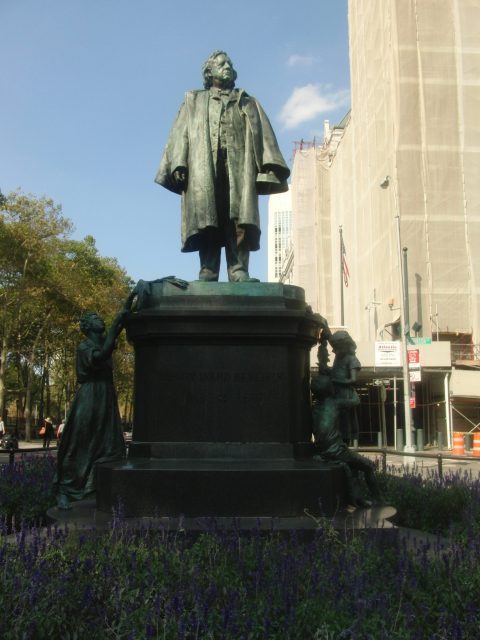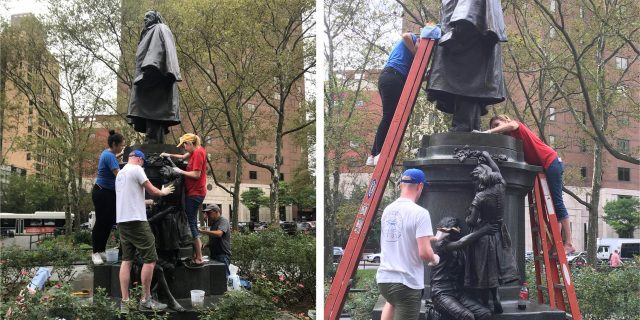
Longtime Brooklyn minister Henry Ward Beecher is honored with statue in Columbus Park (photo by twi-ny/mdr)
Columbus Park
Cadman Plaza near Johnson St.
www.nycgovparks.org
www.mas.org
“It is not what we take up, but what we give up, that makes us rich,” American abolitionist, orator, minister, and social reformer Henry Ward Beecher said. The eminently quotable Connecticut native and longtime Brooklynite would most likely have a lot to say about the novel coronavirus, particularly this Easter weekend as many churches around the country remain open, declining suggestions and even local regulations regarding social distancing.
“To array a man’s will against his sickness is the supreme art of medicine.”
Beecher first served as a Presbyterian minister in Indiana before moving to Plymouth Church in Brooklyn in 1847. He advocated for evolution, science, and woman suffrage and against slavery while also generating a spectacular sexual scandal. Beecher was a celebrity preacher, and he got a lot of press; he was even popularized in limericks, such as this fine one from English writer and artist Oliver Herford: “Said a great congregational preacher / To a hen, ‘You’re a beautiful creature.’ / And the hen, just for that, / Laid an egg in his hat, / And thus did the Hen reward Beecher.”
“Expedients are for the hour, but principles are for the ages.”
Master sculptor John Quincy Adams Ward, who designed statues of George Washington at Federal Hall, Horace Greeley in City Hall Park, William Earl Dodge in Bryant Park, Roscoe Conkling in Madison Square Park, and William Shakespeare, the Indian Hunter, and the Pilgrim in Central Park, honored Beecher with a monument dedicated at Borough Hall in 1891 and relocated to Columbus Park in 1959; the face was modeled after a death mask Ward made of Beecher on March 8, 1887, when the minister died at the age of seventy-three.
“Law represents the effort of man to organize society; governments, the efforts of selfishness to overthrow liberty.”
In a closed-off grassy area, Ward’s figure of Beecher stands proudly on a Barre granite plinth designed by architect Richard Morris Hunt. Beecher is dressed in an Inverness cloak, arms at his side, staring off into the distance, his eyes on the future. To his right, a young black woman places a palm branch on the pedestal at his feet, while to his left a pair of white children offer a garland. The unpunctuated inscription on the back reads: “The grateful gift of the multitudes of all classes creeds and conditions at home and abroad to honor the great apostle of the brotherhood of man.” The sculpture was restored in 2017 and 2019 as part of the Municipal Art Society of New York’s Adopt-a-Monument/Mural program.

Henry Ward Beecher monument undergoes restoration in 2019 (photo courtesy Municipal Art Society of New York)
“There is no faculty of the human soul so persistent and universal as that of hatred.”
Beecher, the son of Presbyterian minister Lyman Beecher and brother of Uncle Tom’s Cabin author Harriet Beecher Stowe, is surrounded by several other prominent works, including Anneta Duveen’s 1972 bust of Robert F. Kennedy, S. Hemming’s 1973 bas relief of Brooklyn Bridge builder Washington A. Roebling, a 1965 marker paying tribute to former Brooklyn borough president John Cashmore, and Emma Stebbins’s large-scale 1867 statue of park namesake Christopher Columbus, rising atop a giant plinth by architect Aymar Embury II.
“When a nation’s young men are conservative, its funeral bell is already rung.”
Beecher, who is interred at Green-Wood Cemetery, wrote such books as Notes from Plymouth Pulpit, Summer in the Soul, Yale Lectures on Preaching, Evolution and Religion, and the novel Norwood, or Village Life in New England. One can only wonder what he would say today about what is happening in Brooklyn and all over the world as a pandemic rages among the populace and divides people along political and religious lines.
“We should not judge people by their peak of excellence; but by the distance they have traveled from the point where they started.”